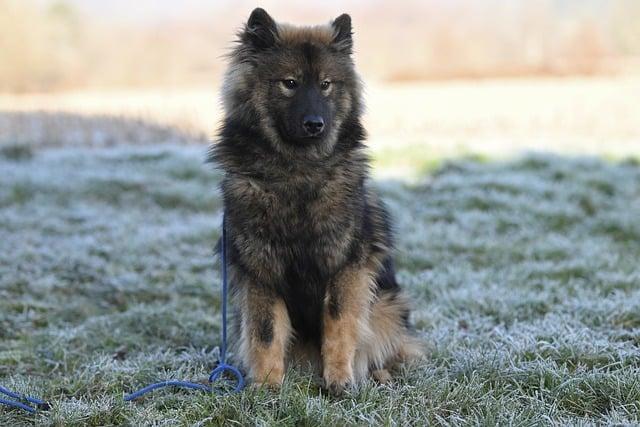Imagine a curious puppy named Max, who loved to chew everything in sight—shoes, furniture, even the remote control. His owner, Sarah, was at her wit’s end until she discovered a surprising solution: citrus scents. One day, she sprayed a mixture of lemon and orange essential oils on her belongings. Max sniffed, recoiled, and never touched those items again! Dogs have a strong aversion to citrus smells, making them an effective deterrent. If you want to protect your belongings, consider using citrus scents to keep your furry friend from destructive chewing.
Contents
- Understanding the Olfactory Sensitivities of Dogs and Their Chewing Preferences
- Identifying Common Smells That Deter Dogs from Chewing
- Effective Strategies to Utilize Unpleasant Scents for Training Purposes
- Choosing Safe and Natural Alternatives to Protect Your Belongings from Chewing
- Q&A
Understanding the Olfactory Sensitivities of Dogs and Their Chewing Preferences
Dogs possess an extraordinary sense of smell, estimated to be between 10,000 to 100,000 times more sensitive than that of humans. This heightened olfactory ability plays a crucial role in their daily lives, influencing their behavior, preferences, and even their chewing habits. Understanding the scents that dogs find unappealing can help pet owners make informed choices about toys, treats, and training methods. By recognizing these aversive smells, you can create a more enjoyable environment for your furry friend.
Research has shown that certain odors can deter dogs from chewing or engaging with specific items. Some of the most commonly disliked scents include:
- Citrus: Many dogs are repelled by the strong, tangy aroma of citrus fruits like oranges and lemons.
- Vinegar: The sharp, pungent smell of vinegar can be off-putting to dogs, making it an effective deterrent.
- Hot Peppers: The spicy scent of hot peppers can trigger a negative reaction in dogs, discouraging them from chewing.
- Alcohol: The strong odor of alcoholic beverages is often disliked by dogs, making it another scent to avoid.
Incorporating these scents into your training regimen can be a powerful tool for discouraging unwanted chewing behaviors. For instance, applying a citrus-scented spray to furniture or using vinegar-based solutions on items you want to protect can help keep your dog at bay. Additionally, understanding your dog’s individual preferences is essential, as some may have unique aversions that differ from the general trends. Observing their reactions to various smells can provide valuable insights into their sensitivities.
Ultimately, the key to managing your dog’s chewing habits lies in a combination of understanding their olfactory sensitivities and providing appropriate alternatives. By offering chew toys that are appealing and safe, while simultaneously minimizing exposure to scents they dislike, you can create a harmonious environment. This approach not only protects your belongings but also fosters a positive relationship between you and your canine companion, ensuring that their chewing preferences align with their well-being.
Identifying Common Smells That Deter Dogs from Chewing
Understanding the olfactory preferences of dogs can be a game changer for pet owners looking to protect their belongings from destructive chewing. Dogs have an extraordinary sense of smell, and certain scents can be particularly off-putting to them. By identifying these common smells, you can create an environment that discourages your furry friend from gnawing on furniture, shoes, or other household items.
One of the most effective deterrents is **citrus scents**. Many dogs find the smell of oranges, lemons, and limes unpleasant. You can easily harness this aversion by using citrus-based sprays or even placing citrus peels near areas you want to protect. This natural solution not only keeps your dog at bay but also leaves your home smelling fresh.
Another scent that dogs tend to dislike is **vinegar**. The strong, pungent aroma of vinegar can be a powerful deterrent against chewing. A simple mixture of water and vinegar can be sprayed onto furniture or other items you wish to protect. Not only does this method help in keeping your dog away, but it also serves as a cleaning agent, making it a dual-purpose solution.
Lastly, **spicy scents**, such as those from cayenne pepper or hot sauce, can be particularly effective. Dogs are sensitive to spicy aromas, and a light application of these substances can deter them from chewing on specific items. However, it’s essential to use these sparingly and ensure they are safe for your pet, as some dogs may have more sensitive reactions than others. By strategically employing these scents, you can create a safe and chew-free environment for your beloved pet.
Effective Strategies to Utilize Unpleasant Scents for Training Purposes
When it comes to training dogs, leveraging their sense of smell can be a game-changer. Many pet owners have discovered that certain unpleasant scents can effectively deter dogs from chewing on furniture, shoes, or other unwanted items. By incorporating these scents into your training regimen, you can create a more positive environment for both you and your furry friend.
One of the most effective strategies is to use **citrus-based sprays**. Dogs generally dislike the smell of citrus fruits like oranges and lemons. By applying a citrus-scented deterrent to items you want to protect, you can discourage your dog from approaching them. This method not only keeps your belongings safe but also helps your dog learn to associate the unpleasant scent with the act of chewing on inappropriate items.
Another powerful option is **vinegar**. Its strong odor is often off-putting to dogs, making it an excellent choice for training purposes. You can create a simple solution by mixing equal parts of water and vinegar in a spray bottle. Spraying this mixture on furniture or other chewable items can help reinforce the idea that these objects are not meant for chewing. Over time, your dog will begin to avoid these areas, leading to better behavior.
Lastly, consider using **commercially available deterrent sprays** specifically designed for dogs. These products often contain bittering agents that are unappealing to dogs, making them an effective training tool. When applying these sprays, be sure to follow the manufacturer’s instructions for optimal results. By consistently using these unpleasant scents in your training, you can create a clear boundary for your dog, helping them understand what is acceptable to chew and what is not.
Choosing Safe and Natural Alternatives to Protect Your Belongings from Chewing
When it comes to safeguarding your belongings from the relentless chewing habits of dogs, opting for safe and natural alternatives is essential. Many pet owners are unaware that certain scents can effectively deter dogs from gnawing on furniture, shoes, or other cherished items. By utilizing these natural deterrents, you can create a harmonious environment that protects your possessions while ensuring your furry friend remains safe.
One of the most effective natural deterrents is **citrus**. Dogs generally dislike the smell of oranges, lemons, and limes. You can create a simple spray by mixing water with citrus juice or essential oils. Spritz this solution on items you want to protect, and you may find that your dog steers clear of them. Additionally, the fresh scent can leave your home smelling delightful, making it a win-win situation.
Another powerful option is **vinegar**. The pungent aroma of vinegar is often off-putting to dogs. A mixture of equal parts water and vinegar can be applied to surfaces that are at risk of being chewed. Not only does this method help to deter your pet, but it also acts as a natural cleaning agent, providing an extra layer of benefit for your household.
Lastly, consider using **bitter apple spray** or **grapefruit oil**. These products are specifically designed to deter chewing and are made from natural ingredients. Applying them to your belongings can create an unpleasant taste and smell for your dog, effectively discouraging them from indulging in destructive behavior. By incorporating these safe and natural alternatives, you can protect your belongings while promoting a healthy relationship with your pet.
Q&A
-
What are some common smells that dogs dislike?
Dogs generally dislike strong scents such as:
- Citrus (lemons, oranges, limes)
- Vinegar
- Hot peppers
- Essential oils (like eucalyptus and peppermint)
-
Can these smells be used to deter dogs from chewing?
Yes, using these unpleasant scents can effectively deter dogs from chewing on furniture or other unwanted items. Spraying a mixture of water and vinegar or citrus juice on the items can create a barrier that discourages chewing.
-
Are there any safety concerns with using these smells?
While most of these scents are safe in small amounts, it’s essential to ensure that any product used is non-toxic and safe for pets. Always test a small area first and consult with a veterinarian if unsure.
-
How can I make my own deterrent spray?
Creating a homemade deterrent spray is simple. Combine:
- 1 part vinegar or citrus juice
- 1 part water
- Optional: a few drops of dish soap to help it adhere
Shake well and spray on the items you want to protect. Reapply as needed for effectiveness.
understanding the scents that deter dogs from chewing can be a game-changer for pet owners. By strategically using these odors, you can protect your belongings and promote healthier chewing habits. Invest in a harmonious environment for both you and your furry friend.

大家好,我是彼得潘,專業的手法身體治療師。我喜歡探索和研究各種主題,並透過與人工智慧的合作分享專業、實用、有趣的文章。我們定期進行人工審核,以確保內容的準確性。如果您發現文章中有任何不準確的地方,請隨時與我們聯繫,我們會及時糾正。您可以透過 [email protected] 與我們聯繫。



